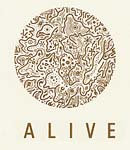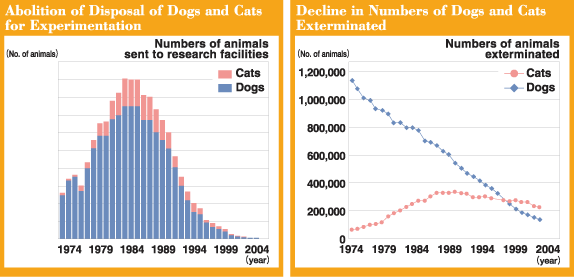 |
ALIVE’s Primary Activities and What We Have Accomplished |
 Domestic
Animals Domestic
Animals
Animal Dealers
There are over 10,000 animal breeders and dealers in Japan. ALIVE
has been investigating those who keep animals in very bad conditions
and campaigning for the tightening of regulations in order to put
them out of business.
The revision of the Japanese Animal Welfare Law in 2005 has made
it mandatory for an animal dealer to register with the appropriate
authority but it is still hard to sweep off unscrupulous dealers.
We are currently campaigning for the next revision, with which
we hope that the sale of live animals at stores will be banned and
further restriction will be placed on animal dealers changing registration
to licensing
Disposal of Unwanted Cats and Dogs
by the Government
Back in 1974, when the animal protection law was first enacted
in Japan, more than 1.1 million cats and dogs were destroyed. This
number was reduced to approximately 340,000 in 2005.
Still, the conditions of public pounds are extremely bad and adoption
of unwanted animals has not progressed as we hoped it would. ALIVE
conducts survey on the current situations concerning animal policies
of municipal governments and urges them to improve conditions of
public pounds.
Abolition of Giving away of Unwanted Animals to Research Facilities
The number of cats and dogs given away to research facilities amounted
to 100,000 in 1986. ALIVE and our sister organization, Anti-Vivisection
Action network (AVA-net) have been working to ban the handover of
unwanted cats and dogs to research facilities and we finally made
the number of animals given away “zero” nationwide in
2006 ! It has taken us 20 years to accomplish this.

Campaign for the Revision of Law
The Animal Welfare Law (which used to be Animal Protection Law
before it was revised in 1999) was revised in 1999 and 2005. It
is, however, still insufficient in many areas and ALIVE is campaigning
for effective measures against animal abuse, introduction of registration
system of animal research facilities, enforcing animal welfare to
farm animals, etc.
 Animals
in Display Animals
in Display
Zoo Check
There are approximately 200 public and private zoos and aquariums
in Japan but there is no law regulating them.
A lot of wild animals are confined in extremely tiny cages.
Since 1996, ALIVE has been conducting zoo check and bear park investigations
and pressuring substandard facilities to close down as well as promoting
improvement of conditions in which animals are kept and enrichment
in captivity. As a result, some facilities have been shut down and
there are some signs of promoting environmental enrichment. We will
request for enacting zoo regulations that are specific and effective.
Surplus Animals
ALIVE is against zoos selling or giving away captive-bred animals
to research facilities. We also monitor to prevent animals being
sold to domestic or overseas facilities in poor conditions.
Regulation on the importation of wild animals
ALIVE is against capturing wild animals for human pleasure and
confining them in zoos. We have succeeded in preventing some plans
of importing wild animals such as rare Asian elephants from overseas
to Japanese zoos.
 Wild
Animals in Japan Wild
Animals in Japan
Bears
In 2004, more than 4,000 bears and in 2005, more than 5,000 bears
were killed for sport hunting or for vermin control. If the killing
bears will continue at this rate, there is a good chance that they
will become extinct. Also, their gall bladder is smuggled as it
is highly profitable. ALIVE has been campaigning for the protection
of bears.
Japanese Monkeys
More than 10,000 Japanese monkeys, who are the only primate species
in Japan besides humans, are killed for vermin control. We investigated
the fact that captured Japanese monkeys were sold to research facilities
and campaigned against it. As a result, the Ministry of Environment
has banned the capture of animals for the purpose of selling them
to research facilities.
But there is still a chance that they are secretly captured and
sold to research facilities and we continue to monitor and investigate.
Banning/Regulating of Traps
ALIVE has been campaigning against the use of traps that hurt and
kill animals at random and, as a result, hunting with the use of
steel-jaw traps has been banned starting 2007. Also the use of snare
traps has been put under severer regulation. We will monitor illegal
use of traps.
Wildlife Protection Law
There is no wildlife protection law that covers all species in
Japan. ALIVE works in coordination with environmental/wildlife protection
organizations all over the country for the establishment of such
law.
 Farm
Animals Farm
Animals
Raising Public Awareness
People are beginning to become really concerned about food safety
because of BSE, 0-157, and avian flu. But little is yet known how
farm animals including cattle, pigs, and chickens are raised. We
investigate, make videos, and hold photograph exhibition of farms
and farm animals in order to let the public know the actual conditions
in which farm animals are kept. We also take part in the study group
consisting of animal behavior experts, consumer groups, and distribution
firms and make policy recommendations.
Lifestyle Changes
We encourage the public to make some adjustment in lifestyle that
costs lives of animals such as fur and meat eating.
|




![]()

 Domestic
Animals
Domestic
Animals
 Animals
in Display
Animals
in Display Wild
Animals in Japan
Wild
Animals in Japan Farm
Animals
Farm
Animals